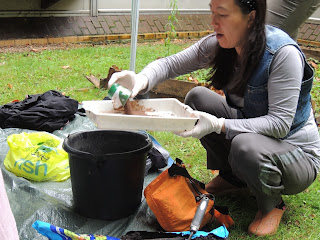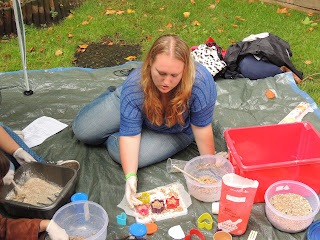 |
| New students bond over bird feed! |
Students from a range of countries including the US, India, Brazil, Sweden and China dodged the British rain showers and settled into the Penrhyn Road community garden for a couple of crafty hours to make wildflower seedbombs and shaped bird feeders.
 |
| One superb seedbomb specimen! |
 |
| Made with love...one of our heart-shaped bird seed feeders. |
Never heard of seedbombs? Let me enlighten you! Seedbombs are little balls made by combining clay, compost and seeds.They are NOT explosive! They are used around the world to introduce wildflower seeds to bare or hard to reach areas in a simple and effective way - by tossing them onto the ground. The clay breaks down when the rain comes and the seeds can germinate with the help of the compost.
 |
| Rachel and Vidhi enjoyed squelching the wet ingredients for the seedbombs together - very therapeutic! |
We made our seedbombs using British wildflower seed which was selected because it contained species which are attractive to bees and butterflies such as red clover, foxglove and yarrow. These plants have evolved with features which suit these creatures down to the ground such as easy access nectar, strong colour and attractive fragrance. We want to do our bit to support biodiversity and particularly these pollinators which are so important for the crops we rely on every day.
Wildflowers provide food and shelter for many mammals, birds and insects, however, the traditional meadows in which they grow in the UK are becoming rare due to things like changing farming methods and building developments.
Our seedbombs will be distributed across our wildflower areas in coming weeks, then we will wait for nature to do the rest! They should provide a good range of food between May and October for the bees and butterflies to feast on, keeping them strong and healthy.
Our seedbombs will be distributed across our wildflower areas in coming weeks, then we will wait for nature to do the rest! They should provide a good range of food between May and October for the bees and butterflies to feast on, keeping them strong and healthy.
Our volunteer beekeeper also kindly donated some seed specifically chosen to attract honey bees. This will provide extra food for our hardworking bees at Kingston Hill, so we will make sure they are dropped nearest the hives at the Kingston Hill Business School wildflower bank. Find out more about our honey bees on our Beehives Blog.
 |
| We used old yoghurt pots to scoop out the ingredients - all in the name of being green! |
 |
| Abbie looks on with pride at the sight of so many seedbombs being made |
We had plenty of takers for making seedbombs, despite it being a mucky job mixing the clay and compost! Following an easy peasy recipe, volunteers scooped, kneaded and rolled the mixture into balls then filled used egg boxes to allow them to dry out.
 |
| Our final tally was an astonishing 187 seedbombs |
Others opted to make shaped bird feeders using store cupboard ingredients such as breadcrumbs and maple syrup.
Getting the consistency right wasn't always easy, but practice makes perfect!
|
Chelsea carefully shapes her bird seed mixture using the cutters for a professional finish!
|
With a mixture resembling tasty flapjack, we had to resist the temptation to eat them as they were cut into hearts and stars and left to dry!
 |
| Our industrious volunteers made 41 gorgeous bird feeders! Well done team!!! |
Ending in the best way possible (with yummy drinks, cakes and biscuits!) and an inspiring talk from Sarah and Abbie about volunteering at KU, the group were soon chatting amongst themselves, discussing project ideas and even organising to go out for the evening together. Now the group has some familiar faces to look out for at the University, we hope they will become regular faces at biodiversity and other volunteering events this year.



No comments:
Post a Comment